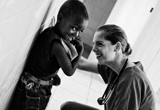 Today marks the one year anniversary since Ebola was confirmed in Sierra Leone. It is not a happy one year anniversary, but there is hope. Thankfully the numbers have significantly reduced from a top high of about 500 new cases per week to about eight cases per week. That is due, amongst other things, to an increase in the number of treatment beds in December (therefore not keeping sick people in the community as long), safe burials, revised messaging to communities (early treatment means a better chance of survival), involvement of community leaders, setting up labs to quickly diagnose Ebola, better treatment options such as intravenous fluids encouraging the public that Ebola is not always fatal, improved contact tracing, and hours and hours of work delivered by individuals in Sierra Leone.
Today marks the one year anniversary since Ebola was confirmed in Sierra Leone. It is not a happy one year anniversary, but there is hope. Thankfully the numbers have significantly reduced from a top high of about 500 new cases per week to about eight cases per week. That is due, amongst other things, to an increase in the number of treatment beds in December (therefore not keeping sick people in the community as long), safe burials, revised messaging to communities (early treatment means a better chance of survival), involvement of community leaders, setting up labs to quickly diagnose Ebola, better treatment options such as intravenous fluids encouraging the public that Ebola is not always fatal, improved contact tracing, and hours and hours of work delivered by individuals in Sierra Leone.
Here we are, a year later. Who would have thought a year ago that we would have 8,608 confirmed cases of which 3,542 people died in Sierra Leone alone? I would never have dreamed that a number of my doctor colleagues would succumb to this dreadful disease. I would never have thought that it would have disrupted the access to and quality of care in so many of the health facilities in the country. However, the facts remain unchanged. We are faced with many losses and left with a crippled healthcare system slowly trying to find its feet.
We cannot change the past, but what we can and should change is the way forward—behaviour change, positive attitudes, remaining vigilant, ending corruption, more collaboration and coordination, implementation of training, recognizing weaknesses and strengthening systems—collectively we can work towards these goals but it will undoubtedly be quite challenging.
Numbers have been reducing since January. We reached eight continuous days of zero cases about two weeks ago and then had new cases again. Today we have reached three continuous days of zero cases. However, it’s not over yet. Cases are still popping up around Western Area and a few other districts. We haven’t seen the end but we remain hopeful that we will soon.
It’s true that the road to zero has been long and bumpy but hopefully we will get there. The road to recovery and improved health systems will be even longer, but we can start making efforts to reach targets. Together we can do this. I pray for continued energy and resilience for all those working to bring Ebola to an end. We must continue to fight this fight. WE DE FET EBOLA! (Krio—translation: We will defeat Ebola!)
Competing interests: None.
Sandra Lako is a doctor from the Netherlands who has worked in Sierra Leone for the past nine years. She spent the first half of her time setting up and managing a paediatric outpatient clinic with an organisation called Mercy Ships. She then joined Welbodi Partnership, a UK based charity supporting the only government run children’s hospital in the country. As country director, Sandra is leading the team to expand their work to the maternity hospital and a community hospital with the aim of improving the accessibility and quality of healthcare for women and children in Sierra Leone.
